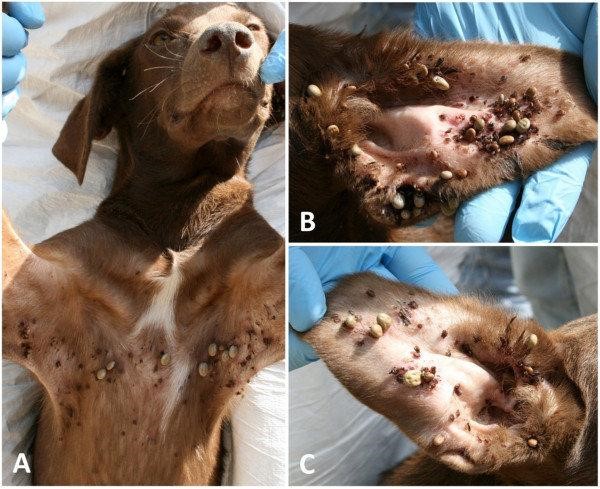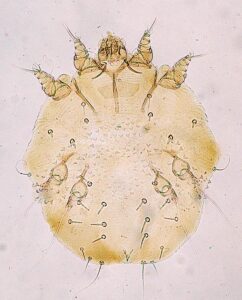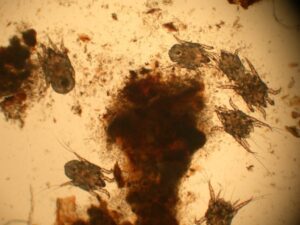Importance of Parasite Prevention in Pets
As a responsible pet owner, you naturally only want the best for your furry companions. In this article, Dr. Seán, longtime vet at VSL Veterinary Clinic, dives into the topic of relevant parasites in Southeast Asia; how to prevent and treat them.
- Internal parasites: roundworms, tapeworms, and more.
- External parasites: fleas, ticks, mites.
So, let’s dive right in.
Internal Parasites
First of all, internal parasites (also known as endoparasites) live in the tissues and organs of their hosts. With a high incidence in Cambodia, worms affect pets and people alike.
How does my pet get worms?
Worms or their eggs are typically ingested by the animal. This can happen when your pet eats something they are not supposed to, or by licking/sniffing grass, soil, plants, other dogs’ poo or another surface where worms have left their eggs.
- Roundworms: Are transmitted from mother to kitten/puppy in the womb, whilst suckling, and by ingestion of roundworm eggs. Therefore, puppies and kittens tend to be infected with roundworms from birth. Roundworms reside in the intestinal tract and produce eggs, which are passed in the poo. These eggs can survive up to two years outside, in soil or on plants, before being unwittingly ingested by pets or even people.
- Tapeworms: Are transmitted by fleas. When your pet grooms or licks themselves, they may ingest a flea that carries a tapeworm. Once inside the intestine, tapeworms can grow up to 60cm in length!
- Hookworms: Can be transmitted in many ways. The larvae living in soil can directly penetrate the skin, or they can be swallowed if the pet licks the ground or cleans soil off their paws after being outside. They can also be ingested if the pet eats a smaller animal that contains worms e.g. cockroach, mouse, or gecko. Finally, puppies/kittens can be infected by the milk of their mother or by their littermates’ poo.
- Whipworms: Are transmitted by contaminated soil; either by the pet directly licking/sniffing the ground or if they groom themselves after being exposed to contaminated soil.
- Heartworms: Are transmitted by mosquitoes. When a mosquito carrying heartworm larvae bites your pet, the larvae are injected via the tiny puncture wound.

Roundworm on leaf (Source: wikimedia.org)
How do I know if my pet has worms?
Intestinal parasites can cause diarrhoea, vomiting, intestinal damage/obstruction, anemia and in severe cases, even stunted growth or death in young animals. Signs are usually less severe in adult animals compared to puppies or kittens, but a high worm burden can also be responsible for a general decline in overall health.
You may occasionally see adult worms as long white stringy things or they may look similar to grains of rice, around your pet’s anus or in their poo.
Dogs infected with heartworm may show no signs at all, or may suffer from weight loss, lethargy, coughing, breathing problems, heart failure, and even sudden death.
How will my vet check for worms?
In order to diagnose intestinal worms, your vet will need a stool sample to check for eggs under the microscope. Heartworm can be detected by a blood test.
How can I avoid worms in my pets?
Deworming dogs and cats regularly is of benefit to the pet, owner, and general public. Pets should start being treated for intestinal worms from 2 weeks of age and then regularly thereafter; exactly how often can depend on lifestyle factors. Cats and dogs should receive heartworm prevention monthly.
Contact your trusted vet clinic to discuss a suitable parasite prevention protocol for your individual pet. VSL has a range of products and is happy to advise you on how often they should be used.
External Parasites
Secondly, external parasites (also known as ectoparasites) live on the outside of their host, either on the skin or fur, or in the ears. The most common are ticks, fleas, and mites.
How does my pet get infested?
Let’s take a look at how your pet may end up with external parasites:
- Ticks: Ticks are found most commonly on grass and plants waiting for an animal to pass. The tick will cling onto your pet’s fur and crawl down to their skin, then bite into the skin and start consuming your pet’s blood.
- Fleas: Fleas spread by jumping from animal to animal. Fleas can jump up to 20cm, that’s over 100 times the size of their own body! If your pet is infested, the fleas on their fur constantly shed eggs into your home. This can make it difficult to prevent reoccurring infestations.
- Mites: Mites cannot jump (like fleas) and they do not live in the environment (like ticks). They can only crawl from one infested pet to another, so are spread by direct contact between animals. The most common mite in dogs is Sarcoptes, which causes mange, and the most common in cats is called Otodectes, also known as the ear mite.
How do I know if my pet has external parasites?
Let’s take a look:
- Ticks: Can be seen with the naked eye. Ticks that are attached to your dog will look like a small grayish-brown bump, and can be as small as a sesame seed or as large as a coffee bean. They are often mistaken for moles or warts, or even nipples!
- Fleas: You may occasionally see a live flea on your cat, but they are very fast and good at hiding in the fur. They are about 3mm long, dark brown, with long narrow bodies and 6 legs. You are more likely to notice your cat scratching frequently and may see flea droppings on your pet; these look like tiny black specks in the fur, which are digested blood and so will turn red if you wipe them up with a damp paper towel.
- Mites: Mites cannot be seen with the naked eye. However, they are very itchy, so you will likely see your pet scratching frequently, so much so that they can cause hair loss and red irritated skin.
Here are some examples:

Dog infested with ticks (Source: researchgate.net)

Cat infested with fleas (Source: vethelpdirect.com)
How will my vet check for external parasites?
Live ticks or fleas may be found on your pet. The vet may use the “damp paper towel” trick mentioned above. For mites, your vet will take a skin or ear wax sample to check under the microscope.

Sarcoptes – mange mite under the microscope (Source: commons.wikimedia.org)

Otodectes – ear mites under the microscope (Source: commons.wikimedia.org)
How can I avoid external parasites in my pets?
It is of utmost importance to avoid your pet becoming infested with parasites. Not only can they cause itching and annoyance, severe infestations can cause secondary skin infections, anaemia due to the loss of blood, and they can spread deadly diseases.
“Tick fever”, a highly prevalent and potentially life-threatening illness, is caused by several different blood parasites that are all transmitted by ticks. Ticks can also spread diseases to humans (Lyme disease, Rocky Mountain Spotted Fever).
Fleas can also spread deadly blood parasites, such as Mycoplasma, to your cat. And don’t forget, fleas are the source of tapeworm infection as we discussed above.
Gardens and parks, grass and bushes serve as a haven for fleas, ticks and worms to breed. But even though indoor pets are at a lower risk, keeping them in won’t keep them safe from heartworm-transmitting mosquitoes and cockroaches/geckos that could be playing host to worm larvae! Rather than restricting your pet’s time outside, use preventative medicines to protect them without compromising on their outdoor fun.
VSL Annual Pet Health Plan
Luckily there are a lot of great options for internal and external parasite prevention available that are very effective, convenient, & affordable. Take a look at our exclusive Annual Pet Health Plan, it PROTECTS your pet from all the parasites mentioned in this article and more…
- Prevention; annual vaccines and monthly flea/tick meds included all year-round
- Reminders; we’ll email you so you never miss a dose
- Optional monthly installments or lump-sum payment
- Treatment for intestinal worms all year-round
- Exclusive benefits – nail clips, discounts, and more
- Consult with one of our international vets, 2 consultations free!
- Tricky to tablet? We administer the medications at no extra charge
- Save up to $186, plans start from $22/month, that’s less than $1 per day!
Sign up and put your mind at ease, knowing your pet will have comprehensive protection year-round.
What’s next?
Contact the clinic for more details on the Annual Pet Health Plan or to book your pet’s appointment
- Phone: 023-986-640
- WhatsApp/Telegram: 017-464-681
- Facebook DM: www.facebook.com/vslveterinary
- Email: info@vslveterinary.com
Visit us in BKK1
- House #33, St. 334 (corner St. 63)
- Google Maps: VSL Veterinary Clinic
- Monday – Saturday: 9am – 7pm
- Sunday: 9am – 5pm
We look forward to welcoming you to our pristine clinic in the heart of BKK1.
